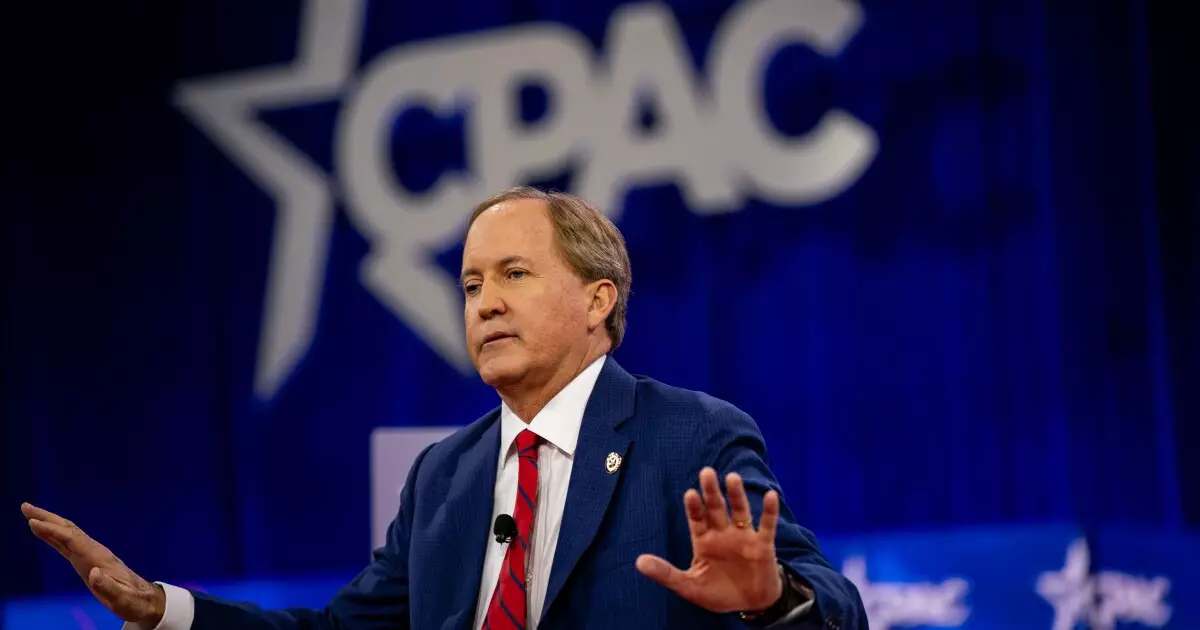In a significant development for the financial and political landscape of Texas, Attorney General Ken Paxton announced the conclusion of a 14-month review concerning Wells Fargo’s affiliations with the controversial Net-Zero Banking Alliance (NZBA). This decision comes on the heels of Wells Fargo’s withdrawal from the alliance, a group advocating for a reduction in greenhouse gas emissions to net-zero by 2050. The implications of this move extend beyond Wells Fargo, illustrating the tensions between financial institutions’ environmental commitments and the political climate in states like Texas, where a strong fossil fuel industry shapes economic policies.
The review initiated by Paxton, which scrutinized several financial giants including Bank of America, JP Morgan, and Wells Fargo, aimed to determine their compliance with a Texas law prohibiting contracts exceeding $100,000 with entities that engage in what the state deems as “boycotting” the fossil fuel sector. This law reflects a growing trend among certain states to push back against the environmental, social, and governance (ESG) movement, which has gained traction over the past decade. By challenging firms involved in sustainable finance initiatives, Texas is positioning itself as a staunch defender of traditional energy sources.
Paxton’s statement following Wells Fargo’s exit from the NZBA conveyed a sentiment welcoming the bank back into the state’s financial fold. He urged other institutions to disregard ESG policies that he perceives as detrimental to the thriving oil and gas sectors in Texas. This rhetoric underscores the broader conflict between environmental sustainability initiatives and state-level legislative frameworks.
Despite the announcement that Wells Fargo can now continue its operations unobstructed, the constitutional validity of Texas’s laws targeting ESG efforts remains contentious. A lawsuit filed against Paxton and Texas Comptroller Glenn Hegar highlights the challenges financial institutions face in navigating these regulatory waters. As more businesses grapple with the repercussions of such laws, the outcome of these legal battles could redefine the landscape for corporate responsibility and environmental action within the state.
Wells Fargo’s status as a senior underwriter for major bond deals, including a substantial $723.5 million revenue bond sale for Dallas Fort Worth International Airport, indicates the bank’s ongoing relevance in Texas’ financial markets. While operating under the scrutiny of state authorities, the bank managed to secure critical contracts, showcasing its resilience and adaptability in a politically charged environment.
The entire scenario illustrates an alarming trend where financial institutions may be compelled to choose between ethical commitments to environmental stewardship and the necessity of remaining operational within states where fossil fuels are a dominant economic force. The precedent set by Texas may encourage other states, particularly in regions reliant on traditional energy sectors, to adopt similar measures against financial entities espousing ESG principles.
Furthermore, the incidents of anti-ESG legislation are not limited to Texas, as evidenced by Wells Fargo’s resignation from its role as lead underwriter for an Oklahoma Turnpike Authority deal. These developments present a complex web of interests where corporate ethics, regulatory compliance, and activism intersect, leading firms to reconsider their growth strategies and partnership decisions.
Looking ahead, the dynamics of how financial firms engage with sustainability will be critical in assessing their operational viability in regions like Texas. The pushback against ESG initiatives could lead to a chilling effect, where corporations feel pressured to abandon their sustainability goals for fear of losing lucrative contracts. Conversely, firms that remain steadfast in their commitments to reducing their carbon footprints may face backlash in states favoring fossil fuel expansion.
As Texas continues to carve out its identity in the discourse surrounding environmental responsibility, the outcome of legislative battles and corporate policies will shape not just its economic future, but potentially serve as a template for other states grappling with similar issues. In the end, this evolving narrative will demand that financial institutions remain vigilant about their roles in both local economies and the broader fight against climate change.


Leave a Reply